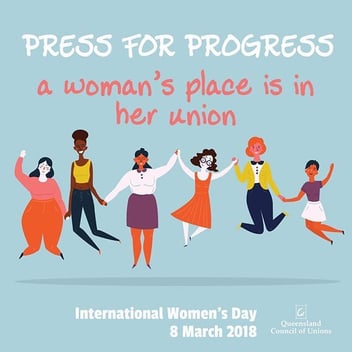Bank boss has little idea on how Australian IR laws really work
From Queensland Council of Unions General Secretary Ros McLennan
It was great to see the Reserve Bank Governor Philip Lowe come out and say that workers deserve a bigger share of the wealth they generate (“Reserve Bank boss backs worker pay rise” — 20 June 2017), and acknowledge the “crisis in wage growth” that stems directly from “a feeling of insecurity” among workers.
What is disappointing though is that he offers no solution to this crisis except that individual workers should stick out their necks and ask for a pay rise anyway — seemingly unaware just how precarious the job market is now and how high the stakes are for workers and their families.
Because the “fair go” is more fantasy than reality for most workers. The rules of engagement have shifted too far to those who own – rather than those who work. You can see where the power lies when annual profits increase by 39% and wages just by 0.9%, according to official figures.
Here are just a few of the pressures modern workers must deal with.
The first is the real rate of unemployment. The “official” rate of unemployment of 5.5% is a lie. It is a measure of how many people work more than one hour per week. One hour per week is not employed. This figure only includes people who have looked for work in the past four weeks and the figure doesn’t include the under-employed.
The real number of Australians looking for work is 2.3 million or 17.6% of the workforce. This is what Australian workers know—that their boss can fire them and find someone to do their job almost instantly.
Not only are there millions of desperate Australians scrambling for work to feed and house themselves and their families, but there are hundreds of thousands of foreign workers on 457 and 417 visas currently exploited by unscrupulous employers and labour hire firms, like the Coffee Club owner fined $180,000 for underpaying his worker $23,546 and making the worker pay pack $18,000 in wages threatening him with deportation if he didn’t. For every case of wage theft and exploitation punished we know there are many more untouched.
Thankfully, here in Queensland we are soon to get state laws that will license labour hire operators. About time, as it is in labour hire that most wage theft and exploitation happens. On this, the federal LNP have said nothing.
Yet every time workers and employers do come together, to create agreements that try and address these situations, by ensuring local workers are used first, or that labour hire workers receive the same pay and conditions as directly employed workers, or clauses that ensure a minimum number of apprenticeships or traineeships come out of project, the LNP come in and declare these agreements illegal!
Even when working collectively, the LNP have introduced laws that restrict the bargaining tools that workers have available. Our current industrial laws are not only in breach of United Nations rights and International Labour Organisation (ILO) standards, they are some of the harshest in the OECD and are out of step with almost every other developed country.
Another pressure that frightens workers is not only the decrease in real wages but the massive increase in the cost of living. Australian workers, living pay to pay, know that they are only ever a few wage-free weeks away from homelessness. They can’t afford to rock the boat. They can’t afford to lose shifts and they definitely can’t afford to get fired.
The average Australian wage is 10 times what it used to be in 1975, while house prices are 30 times more. Speaking of debt, today’s young workers are starting their working lives with large HECS debts, while those 40 years ago had none.
While we are on the subject of study, successive LNP Governments have gutted tertiary education funding bringing it to historic lows, and have overseen a VET sector stripped of funds and full of private providers that keep going out of business leaving thousands of Australian battlers thousands of dollars in debt with nothing to show for it. The federal LNP even tried to privatise TAFE last year.
Coming back to simply asking for money, Governor Lowe is naive if he thinks that the average barista, boilermaker, butcher, bank teller, public servant, teacher, nurse or thousands of other workers can simply ask for more money and not be laughed out of the room — if not simply fired. Especially with such a stacked system in which workers have so many pressures, a federal government that just doesn’t care and employers who view them as a number on a spreadsheet and nothing more.
So, while the acknowledgement of Australia’s wage crisis is welcome, it is a little disingenuous of Governor Lowe to suggest workers simply “ask for a wage rise”.
But there is hope. Workers have been in this situation before. There was a time, at the beginning of the twentieth century, in which big business and the government formed an alliance to keep workers in their place. In which the gap between the rich and workers was just as large, and workers were treated just as poorly.
However, workers banded together and demanded collectively for their fair share of the wealth their labour generated. And it worked, giving Australian workers all the conditions we now take for granted—weekends, penalty rates, sick leave, annual leave, unfair dismissal protection, the minimum wage plus much, much more.
And what happened? Inequality decreased. The middle class grew. Small business profited as the workers had money to spend to purchase their goods and services.
Governor Lowe is right. Workers need a higher wage, but it won’t come unless we all work together and fight for it ourselves. It is time for the balance to swing back the other way.
We have done it before and we can do it again. Join your union. Tell your parents, your siblings, your children, your friends and neighbours to join their union. Only together can we shift the power back to a fair place.


